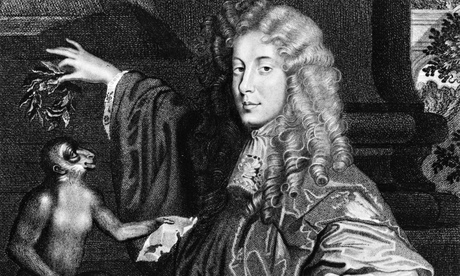
If you are looking for conventional love poetry for Valentine’s Day, the verse of John Wilmot, second Earl of Rochester, might not be your best bet. Any man who wrote a poem called Against Constancy is never going to subscribe to hearts-and-flowers romance. A leading figure of the Restoration court – its “blazing star”, if you will – Rochester lived out his life like a mixture of rock-star and prophet, piercing the glittering facade of the world he inhabited and exposing in his poetry the dirt and depravity behind. Dying cruelly young at 33, he deprived England, and its literature, of one of its brightest lights. He has gone on to enjoy a remarkable afterlife, being played by Johnny Depp and featured in a song by Nick Cave, but his writing has resisted all attempts to pin it down, and continues to provoke and delight more than three centuries after his death in 1680.
For many, it comes as a shock to read Rochester’s poems for the first time. Four-letter words are gaily scattered about in a manner sure to offend the prudish, and the force of the sexual and scatological imagery to be found in his writing means that preconceptions of what poetry – especially Restoration poetry – “should” be are challenged. Poems such as his bawdy social satire Signior Dildo, the chillingly misanthropic A Ramble in St James’s Park, and his brilliant meditation on premature ejaculation The Imperfect Enjoyment are strong stuff, even today; no wonder that his work was sold as pornography until the middle of the 20th century. But then again, what else can you say about a man who said of himself, in Upon His Drinking a Bowl:
Cupid and Bacchus my saints are,
May drink and love still reign!
With wine I wash away my cares,
And then to cunt again.
Yet once the initial shock has worn off, other nuances reveal themselves. He writes in an accessible and straightforward fashion that would have seen his work anthologised in many collections if it weren’t for the eyebrow-raising details. Pigeonholing Rochester as merely smutty misses the point. The self-proclaimed “peerless peer” was a hugely able satirist. His most notable achievement was the magnificent vituperation of A Satire Against Reason and Mankind, which simultaneously offers closely reasoned intellectual argument and witty pastiche of the high-blown bluster of the time. But his attacks on the great and the good of his age – even Charles II – are hilariously readable, the contemporary equivalent of a standup comedian laying into puffed-up public figures.
And if you are looking for romance in Rochester, then it may come as a surprise to find that, when he wished to be, he was a talented poet of love as well as sex. Some of his love poems, such as Absent from Thee I languish Still and ’Twas a dispute ’Twixt Heaven and Earth, are by turns beautiful and artfully knowing responses to the contemporary fashion for turning all women into classical goddesses. And in his greatest short poem, Love and Life, he combines sentiment with a prescient look at what his reputation will be:
All my past life is mine no more,
The flying hours are gone,
Like transitory dreams giv’n o’er,
Whose images are kept in store
By memory alone.The time that is to come is not;
How can it then be mine?
The present moment’s all my lot;
And that, as fast as it is got,
Phyllis, is only thine.Then talk not of inconstancy,
False hearts, and broken vows;
If I, by miracle, can be
This live-long minute true to thee,
’Tis all that Heav’n allows.
In his poetry, Rochester adopts a kaleidoscopic whirl of poetic personae and voices that make his work by turns funny, surprising and affecting. One thing that it never is – just as its author never was – is predictable. If it remains all too fleeting (even imperfect) a pleasure, it’s worth bearing in mind his words from A Very Heroical Epistle In Answer to Ephelia – “No glorious thing was ever made to stay/ My Blazing-Star but visits, and away.”

